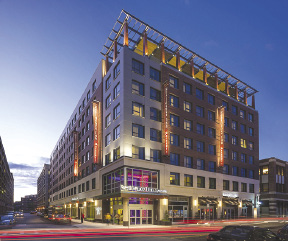Forecasts are in for the future of the lodging industry - and things are looking good for the hotel market over the next few years. According to a current market analysis by PKF Consulting USA, the industry is well on its way to a recovery with very few factors in existence today that could stall or derail hotel industry growth.
On the national level, the industry is expected to experience gains in RevPAR, occupancy, and ADR through 2014 and 2015. Other national economic factors are also calming previous anxieties over hotel development. Home prices are escalating, availability of credit is up, and job and economic growth looks positive.
For Boston, we are expected to see incremental growth in all major performance metrics including hotel occupancy rates, RevPAR, and ADR through next year. Boston's hotel occupancy continues to be in the upper 70th percentile, well above the U.S. average that holds steady in the mid-60s. On top of that, the city continues to rank as one of the most desirable markets for expansion in the United States.
Despite encouraging reports in the local sector, the national market is still expected to outpace Boston's overall hospitality growth during the next few years. Why? Some industry insiders say Boston is "overbuilt."
There has been and continues to be a lot of talk about the shortage of hotel rooms in the Boston market. There have been two new construction hotels opened in the last five years. Currently there is an estimated 2,000 rooms in the permitting and/or planning stages. But it remains true that there is a high barrier to entry in the Boston hotel market, a shortage of readily available land to develop, and high property values.
Of the 50 U.S. lodging markets that PKF Consulting USA tracks, they report that Boston was one of only 9 markets to surpass its long-run average occupancy back in 2010. Since then, occupancy in the Boston market has continued to increase. When baseline performance is this strong compared to other markets, percentage increase tends to be lower. At peak performance, over time growth reverts closer toward the mean. When a market continues to perform at such a high level of occupancy with continued average daily rate growth, PKF shares, it demonstrates demand support for the development of new hotel rooms.
Despite the facts, the larger full service hotels can still trade at or below the replacement cost. In fact, there is limited development in sight for the larger full service hotels. The select service hotels are still in need throughout the city and are the driving force in room rate based on the level of service they are providing. That being said, there is a ceiling for these properties, and combined with the market's high barrier to entry - the economics of development can be very difficult at times.
With these factors in play, the bottom line is that there IS room for growth in the Boston hotel market. And the claim that Boston is "overbuilt" is "overhyped."
So what does the future look like for Boston hotels? The select service hotel brands will be the next influx of Boston hotels. Their limited service offerings and minimal overhead delivers fair cash returns without excessive risk and associated labor costs.
Most importantly, the demand for these types of hotels is there. The city has three new hotel offerings that Group One Partners has delivered, two of which opened this past summer. Both of these hotels are select service properties and are performing well above expectations. This is proof of the demand and growth opportunity of these properties throughout Boston.
The two recently opened select service hotels were the Marriott Residence Inn Fenway and the Marriott Residence Inn Seaport - both of which opened in the past six months, sold out during their opening week, and have continued to boast high occupancy rates during the subsequent months. Why?
In addition to their limited service offerings, they provide consumers with a unique travel experience and are custom designed to complement their surroundings and provide guests with an authentic experience. Today's travelers want a customized experience that they can take away with them. They want to connect with and have an emotional attachment to the properties they stay at. Hotels can no longer be cookie cutter; they have to offer enhanced, unique designs.
These two Marriott-franchised properties are perfect examples of this. Residence Inn Fenway features a rooftop terrace with partial views of Fenway Park. Residence Inn Seaport is a historical renovation that transformed a 1900's warehouse into an urban loft hotel. Both properties have custom lobbies, personalized amenities, and killer locations - all of which continue to be in high demand by today's business travelers.
And let's not forget the importance of what more hotel rooms would mean to the city of Boston. With more available hotel rooms, Boston would have the increased ability to host large national and international conventions and events. As it currently stands, because of our high hotel occupancy rates, convention planners cannot pre-book large groups and therefore we miss out on this economic opportunity as a city.
According to research by PKF Consulting USA of a dozen convention markets in the U.S., the addition of a convention headquarters hotel induced demand to the market that was equivalent to upward of 50 percent of the rooms available at the new hotel. One driving factor of convention demand is the number of hotel rooms proximate to a convention center as compared to its competitive destinations. The fewer hotel rooms within walking distance, the less desirable the destination is to a convention meeting planner. New hotel rooms added proximate to the convention center creates the opportunity to book more citywide conventions, thus inducing demand to the market. If we expanded the number of available hotel rooms, our hotel occupancy rate may fall a few points but the City would still have an occupancy rate well above the national average. In addition, the hotel rates would stay stable or increase slightly due to the increased demand for convention and travel business.
In addition to the above, the third new hotel being brought to the market is the Autograph Hotel that is under construction in the Seaport Square area. Unlike the select service hotels, this property will offer luxury accommodations, a destination dining venue and a one-of-a-kind rooftop amenity with unparalleled views of the city skyline. A boutique property such as this can bridge the gap between the larger full service and select service brands as it is a manageable size and therefore can be run very efficiently while still providing guest services and achieving or exceeding rates to its larger full service comps due to its level of service and unique guest experience.
What's the bottom line? So is there an opportunity to expand the Boston hotel market? The answer is yes! Room occupancy is there. Good design generates high room rates. And hotel properties can be developed at reasonable costs for above average returns.
According to findings from the Pinnacle Advisory Group 2014 outlook, the city of Boston can accommodate 18 to 27 new hotels representing select service brands without oversaturating the market.
The different city sections - Seaport, Financial District, Back Bay, Kenmore Square, etc. - all show growth opportunities. And the Greater Boston market further shows steady growth of hotel occupancy rates and ADR.
There is a tremendous opportunity for select service brands like Hilton, Hyatt, Starwood, and Choice to continue to expand into the Boston market as they are under-represented. Right now any brands that are not building in Boston are turning away thousands of room nights annually.
Overall, some may argue over the exact number of hotel rooms that Boston can build. But no one can argue that Boston needs more and is FAR from being overbuilt. The future of the Boston hotel market looks bright.
Harry Wheeler AIA, NCARB, LEED is a principal at Group One Partners, an award-winning hospitality design firm based in Boston that specializes in architectural, interior design, and purchasing services for hospitality properties.
As principal of Group One, Wheeler serves as the head of business development and marketing. Since joining the firm in 1996, he has been involved in all aspects of the design and construction of hundreds of hospitality, residential, and multi-family properties, assisted living and elder care facilities, and retail spaces.
Wheeler earned his bachelor's degree of architecture and bachelor's degree of architectural engineering from Wentworth Institute of Technology in Boston. He is a registered architect in 10 states and a member of numerous architectural, lodging, and marketing associations.
Tags:
Overbuilt is over-hyped: The promising future of the Boston hotel market
December 20, 2013 - Front Section










